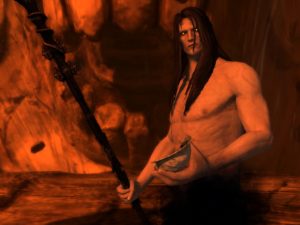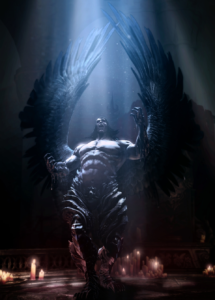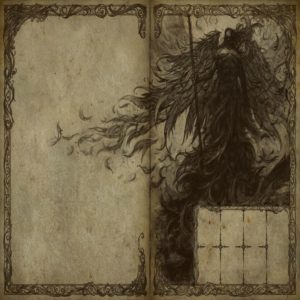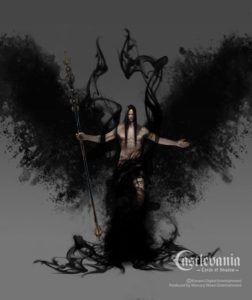The Miltonic-Romantic Lucifer makes an interesting appearance in Castlevania, the action-adventure videogame series that made its U.S. debut in 1987 (debuting a year earlier in Japan), spawning a plethora of sequels spanning several gaming platforms. Castlevania was essentially a great homage to the horror genre, paying tribute to Dracula in particular, the series’ vampire-hunting Belmont family incessantly hunting the immortal Count from game to game. Castlevania was rebooted with 2010’s Castlevania: Lords of Shadow, which resulted in a 2014 sequel, and in these last two installments of the undying series, homage was paid to a character far greater than Dracula: the Devil himself, as descended from the Miltonic-Romantic tradition.
Castlevania: Lords of Shadow, set in an apocalyptic eleventh century, follows Gabriel Belmont of the “Brotherhood of Light,” an order of knights responsible for protecting the world from otherworldly enemies. The Lords of Shadow of the title have disrupted the natural order by casting a malevolent spell keeping the deceased in a perpetual limbo, preventing them from crossing over to the afterlife. Gabriel’s quest to defeat the Lords of Shadow is personal, as his wife was slain by a supernatural creature (or so he believes). An elder member of the Brotherhood by the name of Zobek (voiced by Patrick Stewart) informs Gabriel of “the God Mask,” which has the power to restore life to the dead. Longing to bring his wife back to life, Gabriel ventures to defeat the three Lords of Shadow and obtain the three pieces of the God Mask. When Gabriel’s journey reaches its climax in the Land of the Necromancers—a tempestuous, ethereal realm not dissimilar to the Hades of the second act of Lord Byron’s Cain (1821)—Zobek reveals that he is the nefarious Lord of the Necromancers, who deceived Gabriel to set him on a journey to eliminate the competition of the other two Lords of Shadow. Zobek explains that he had ventured to Hell in search of the power that would enable him to disrupt the natural order and set the events of the story in motion. Orchestrating this charade included compelling Gabriel to take the life of his own wife, which, when revealed to our hero, naturally plunges him into despair.
As Zobek, with the God Mask in his grasp, revels in his victory before the subdued Gabriel, he suddenly hears a diabolical laugh, followed by a sinister voice. “Hail, Mighty Zobek,” mocks the unseen speaker, who proceeds to explain to the frightened Zobek that it was he who granted the supernatural strength beyond Zobek’s own reach. It is revealed to the manipulative, self-serving Zobek that he, like Gabriel, was but the tool of another’s plan. “I planted the idea for this whole elaborate ruse into your tiny mind in order to serve my own higher purpose,” announces the voice. “I no longer need your assistance. The power is now mine!” With that, Zobek spontaneously combusts, crumbling to the ground. Casually walking through the flames and stepping over the corpse of Zobek, Satan enters the scene and takes possession of the God Mask.
Satan now in full sight, it is clear how indebted this interpretation of the fallen angel is to the Miltonic Devils depicted by Romantic artists. Like the portrayals of Milton’s Satan wrought by Barry, Lawrence, Fuseli, and Blake, this Satan is wingless (although he can summon “shadow wings” at will during the actual boss battle) and nude, with the superhuman form and the dignified bearing befitting a Greco-Roman god. This Satan has no horns, hoofs, or tail, but an athletic figure, his head crowned with long black hair (with little of the character of many a Romantic Lucifer’s locks, it must be said), which drapes down his back and chest. Satan’s demonic aspects are relatively subtle: translucent skin, menacing eyes (pitch-black sclerae punctuated by glowing pupils), and an ethereal darkness that swirls about his lower half. A convincing portrayal of Satan as “Arch-Angel ruin’d,” as he is “Majestic though in ruin” (PL, I.593; II.305), this Satan’s majesty and menace are complemented by his haughty voice, executed perfectly by Jason Isaacs, who in the 2000 film The Patriot had played the English Colonel William Tavington, who was, in the words of proud Englishman and Satanist Gavin Baddeley, “absurdly evil…”1 Castlevania’s less absurd Satan, gripping a massive staff much like Milton’s Satan grips his mastlike spear (I.292–96), lifts his malevolent gaze skyward and vaunts his “higher purpose”: “Father! I come for you… Before the end YOU will bow down to ME!”
 As Gabriel is miraculously restored to life by spirits at the behest of his wife’s ghost, Satan attempts to form an alliance with the man, drawing parallels between their doomed dispositions: “So… he has abandoned you, too? So be it. Join me. I will love you more than He!” Turning to face Gabriel, Satan reminds the devout knight that he, first of the damned, was once Heaven’s preeminent angel: “I was adored once above all others. I too didn’t deserve to be cast out… abandoned. Now you know what that feels like, don’t you…? Hate can bring us back, give us strength. Embrace it!” It is a moment very much reminiscent of Lord Byron’s Lucifer, who approaches Adam’s firstborn son Cain as something of a Promethean patron, professing, “I know the thoughts / Of dust, and feel for it, and with you” (I.i.100–01), styling himself and his human counterpart as reflections of one another: “Souls who dare look the Omnipotent tyrant in / His everlasting face, and tell him, that / His evil is not good!” (I.i.138–40). Yet, while the Byronic Cain can relate to the arch-rebel Lucifer—“Thou speak’st to me of things which long have swum / In visions through my thought” (I.i.167–68)—Castlevania’s Gabriel Belmont is not swayed in the slightest by the Tempter. “He loves you as he loves me,” Gabriel reassures the fallen angel, the knight reaffirming his faith in God: “We have only to ask for forgiveness deep within ourselves and be welcomed back.” Ever the arrogant angel, Satan gibes, “You monkeys don’t deserve redemption.”2 Satan’s scorn for mortal “monkeys” may betray the dishonesty of his proposed alliance, but then again we are once more reminded of Byron’s Lucifer, who expresses respect for Cain in his likeminded defiance of Jehovah, yet as a spirit—indeed, a “Master of spirits” (I.i.99)—holds humans in disdain as “dust” and “clay.”3
As Gabriel is miraculously restored to life by spirits at the behest of his wife’s ghost, Satan attempts to form an alliance with the man, drawing parallels between their doomed dispositions: “So… he has abandoned you, too? So be it. Join me. I will love you more than He!” Turning to face Gabriel, Satan reminds the devout knight that he, first of the damned, was once Heaven’s preeminent angel: “I was adored once above all others. I too didn’t deserve to be cast out… abandoned. Now you know what that feels like, don’t you…? Hate can bring us back, give us strength. Embrace it!” It is a moment very much reminiscent of Lord Byron’s Lucifer, who approaches Adam’s firstborn son Cain as something of a Promethean patron, professing, “I know the thoughts / Of dust, and feel for it, and with you” (I.i.100–01), styling himself and his human counterpart as reflections of one another: “Souls who dare look the Omnipotent tyrant in / His everlasting face, and tell him, that / His evil is not good!” (I.i.138–40). Yet, while the Byronic Cain can relate to the arch-rebel Lucifer—“Thou speak’st to me of things which long have swum / In visions through my thought” (I.i.167–68)—Castlevania’s Gabriel Belmont is not swayed in the slightest by the Tempter. “He loves you as he loves me,” Gabriel reassures the fallen angel, the knight reaffirming his faith in God: “We have only to ask for forgiveness deep within ourselves and be welcomed back.” Ever the arrogant angel, Satan gibes, “You monkeys don’t deserve redemption.”2 Satan’s scorn for mortal “monkeys” may betray the dishonesty of his proposed alliance, but then again we are once more reminded of Byron’s Lucifer, who expresses respect for Cain in his likeminded defiance of Jehovah, yet as a spirit—indeed, a “Master of spirits” (I.i.99)—holds humans in disdain as “dust” and “clay.”3
The Satan of Paradise Lost’s “Monarchal pride” (II.428) and ambition “to have equall’d the most High” (I.40) are overstressed in Castlevania’s portrayal of the Prince of Darkness: “It is MY divine right to rule by his side as an equal… Or perhaps more than that…”4 “You would rather rule in power and might than to offer forgiveness and love?” asks Gabriel, pitying the fallen angel for his waywardness: “This is why you are cast out, unholy one!” Satan’s pride is needled by Gabriel’s “blasphemy,” which underlines his sense of his own godhood, and so Satan promises to deliver Gabriel his death. After a Castlevania-style slugfest, Gabriel subdues the God-Masked Satan, and a pillar of divine light envelops the two. Despite his contemptuous defiance, Satan is unmasked and vanquished by the unseen hand of the Almighty, the tempestuous Land of the Dead calming with the Devil’s disappearance.
In the game’s epilogue, set in modern times, it is revealed that Zobek still lives and that Gabriel has been cursed to live on as the immortal Dracula. Zobek has come to inform Gabriel/Dracula that “Satan’s acolytes are readying for his imminent return.” Knowing full well that Gabriel yearns for the release of death, Zobek promises to free him of his vampiric immortality in exchange for his help in dealing with the Satanic crisis.
In Castlevania: Lords of Shadow 2, which largely (and jarringly) takes place in a modern urban setting, Gabriel/Dracula and Zobek work together to hunt down Satan’s acolytes. At the end of the unevenly paced game, the third acolyte—a demonic-looking Crowley type by the name of Guido Szandor (after Anton Szandor LaVey, founder of the Church of Satan)—successfully summons Satan to the mortal plane in appropriate supernatural spectacle. The third acolyte falls to his knees before his Lord, who spreads his dark wings to reveal himself. It is immediately apparent that this Satan possesses none of the subtlety of his incarnation in the previous game. Satan is now a massive, hulking figure with a pallor more haunting than Dracula’s, his lower half covered in spiky silver armor, his forearms dripping with tar. Satan’s black hair is shorter and stringier, and his eyes are now pronounced by their glowing purple irises. The only interesting aspects of Satan’s significantly altered appearance are his tremendous black-feathered wings—albeit strangely protruding from his lower back—and his facial scars, which was a feature of Milton’s portrait of Satan (I.600–01) missing from all artistic renditions.
 While Satan’s last acolyte stares up at his Lord in awe, Satan looks down with disgust, clearly irritated by the sight of Gabriel/Dracula, still alive and well after all this time. Satan slowly steps forward and lifts up the bowed head of his acolyte, as one would a loyal dog, but suddenly jags his fingers into the acolyte’s throat and peels off the man’s face, delivering his faithful servant a painful demise. Satan tosses the shocked face of the acolyte aside in disdain and remarks with a shrug, “I despise incompetence.” Satan once again proposes an alliance with Gabriel: “We could share this world…you…and I…” Dracula and his son, Alucard (“Dracula” reversed), remain silent, Satan chuckling, “But you desire to destroy me… I see that now.” Satan then shifts his motive from conquest of the world to its wanton destruction: “I’m very well aware of your power, Gabriel. However…I desire to destroy this world.” With that, the room begins to quake and split apart, and as the surroundings crumble, Satan vaunts, “If I cannot rule the world of men…then no one will!”
While Satan’s last acolyte stares up at his Lord in awe, Satan looks down with disgust, clearly irritated by the sight of Gabriel/Dracula, still alive and well after all this time. Satan slowly steps forward and lifts up the bowed head of his acolyte, as one would a loyal dog, but suddenly jags his fingers into the acolyte’s throat and peels off the man’s face, delivering his faithful servant a painful demise. Satan tosses the shocked face of the acolyte aside in disdain and remarks with a shrug, “I despise incompetence.” Satan once again proposes an alliance with Gabriel: “We could share this world…you…and I…” Dracula and his son, Alucard (“Dracula” reversed), remain silent, Satan chuckling, “But you desire to destroy me… I see that now.” Satan then shifts his motive from conquest of the world to its wanton destruction: “I’m very well aware of your power, Gabriel. However…I desire to destroy this world.” With that, the room begins to quake and split apart, and as the surroundings crumble, Satan vaunts, “If I cannot rule the world of men…then no one will!”
A massive, wormlike leviathan bursts through the floor, Satan surfing the beast into the sky. Dracula and Alucard mount the ascending leviathan and, of course, manage to slay the monster before it is able to carry out Satan’s command to destroy the world. As the debris falls, Satan transforms into tarry ethereal form and possesses the body of Alucard, as he believes Gabriel will not be able to harm the body of his son. After the game’s final boss battle, the two fall from the sky and crash into a city street like meteorites. “You won’t kill your son to destroy me,” mocks the incapacitated Satan/Alucard. Gabriel begs to differ, and as he proceeds to stake the body of Alucard in dramatic slow-motion, Satan dives out of the boy’s body and assumes his own form. Having anticipated this, Gabriel thrusts Satan against a gate and daggers him, at which point the impaled Satan goes limp and collapses. In an anticlimactic ending, Gabriel revives his son Alucard with blood from his own veins and exits before sunrise, leaving the demonic corpse of the fallen angel lying on the pavement.
Satan’s first Castlevania incarnation was subtle, the Prince of Darkness given an angelic beauty slightly sullied by his exile from Heaven, much akin to Romantic renditions of Milton’s Satan in the visual arts. Satan likewise possessed the Miltonic-Romantic arch-rebel’s aristocratic demeanor and titanic ambition, and his mixed sympathy and contempt for the Gabriel character recalled the ambiguity of the Byronic Lucifer. Satan’s second Castlevania incarnation is as different from his first as could possibly be. While he formerly sought to re-ascend into Heaven and bring the Almighty to his knees, here Satan’s ambition is far more measured, as he wishes only to rule the mortal world and settles for demolishing it. While he formerly reflected on his prestigious place in Heaven, brooded over his infernal ruin, vaunted his patricidal/deicidal endeavors, and exuded an air of monarchal divinity, here Satan is given few lines (a terrible waste of the vocal talent of Jason Isaacs), all of which completely lack the complexity of his dialogue in the first game. The entire Castlevania: Lords of Shadow 2 game builds up to an epic confrontation between Dracula and Satan, but they hardly exchange words and their battle is terribly brief, the payoff in terms of story and gameplay tremendously unfulfilling for the player. Alas, if Castlevania summoned the Miltonic-Romantic Satan in the first Lords of Shadow game, its sequel vanquished him with little care, having recast the regal apostate angel as a monstrous, muscle-bound brute roid-raging through the cosmos.
Notes
1. Gavin Baddeley, with Dani Filth, The Gospel of Filth: A Bible of Decadence & Darkness (Godalming, Surrey: FAB Press Ltd., [2009] 2010), p. 42.↩
2. This Satan’s dialogue, it must be said, appears to be somewhat indebted to the Lucifer of the 1995 film The Prophecy: Lucifer, as played with relish by Viggo Mortensen, asserts, “I was the first angel, loved once above all others,” and in the end amusingly pleads for the male lead’s alliance thus: “I love you! I love you more than Jesus!” Mortals are routinely referred to as “monkeys” by the disdainful angelic characters throughout the film.↩
3. Certain critics of Byron’s Cain have insisted that its portrayal of Lucifer is traditional, the rebel angel’s companionship with Cain a false face. See, for example, N. Stephen Bauer, “Byron’s Doubting Cain,” South Atlantic Bulletin, Vol. 39, No. 2 (May, 1974), pp. 80–88, and Wolf Z. Hirst, “Byron’s Lapse into Orthodoxy: An Unorthodox Reading of Cain,” Keats-Shelley Journal, Vol. 29, (1980), pp. 151–72.↩
4. This is also reminiscent of St. Anselm’s unique assessment of Satan’s self-sought apotheosis in his essay On the Fall of the Devil (ca. 1080–1086). Anselm explains that Lucifer aspired to godhead not by attempting to overpower the Almighty—an impossible act that a supernatural being as intelligent as Heaven’s highest angel could not possibly have believed—but by merely being prideful, which is to say, by valuing his own self-will above the will of God. In exalting his own will above God’s will, Satan’s ambition, according to Anselm, was to be not only equal to but in fact greater than God: “Even if he didn’t will to be completely equal to God, but instead willed something less than equality with God that was contrary to God’s will: by that very fact he willed inordinately to be like God, since he willed something by his own will, which was not subjected to anyone else. For it is the prerogative of God alone to will anything by his own will in such a way that he does not follow any higher will.…Now he did not merely will to be equal to God by presuming to have a will of his own; he willed to be even greater than God, in that he placed his own will above God’s will by willing what God didn’t want him to will.” (Anselm, On the Fall of the Devil, in Basic Writings, ed. and trans. Thomas Williams [Indianapolis: Hackett Publishing Company, Inc., 2007], p. 178.) See also John M. Steadman, “Satan and the Argument from Equality,” in Milton’s Epic Characters: Image and Idol (Chapel Hill: The University of North Carolina Press, [1959] 1968), pp. 160–73.↩

